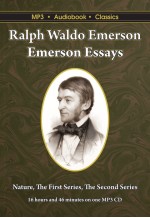Ralph Waldo Emerson
| Ralph Waldo Emerson (May 25, 1803 – April 27, 1883) was an American essayist, lecturer and poet best known for his essays and for leading the Transcendentalist movement. He was a champion of the emerging idea of individualism and a critic of the constraints imposed by conformity to prevailing social and religious beliefs. His essays , which usually were developed from his many lectures, set the course of much of the intellectual life of the country. Waldo, as he liked to be called, was born in Boston the son of a Unitarian minister who died when he was eight years old. He attended Boston Latin School, Harvard College and subsequently Harvard Divinity School, which exposed him to new translations of Hindu and Buddhist poetry. He was ordained as minister of the Second Church in Boston in 1829 and married Ellen Louisa Tucker that same year, who died of tuberculosis within a few years but left him with a small inheritance. He married Lydia Jackson in 1835 and settled in Concord, Massachusetts, where they raised four children and entertained many noted artists and intellectuals, such as Nathaniel Hawthorne, Bronson and Louis May Alcott, and Henry David Thoreau, whose cabin on Walden Pond stood on Emerson property. In the 1830’s Emerson gradually parted company with conventional beliefs and began to articulate a pantheistic sensibility in which God and the world were indivisible. The first and formative expression of the Transcendentalist philosophy appeared in 1836 in his essay “Nature”; his ground-breaking speech, “ The American Scholar”, in 1837, was called America’s “Intellectual Declaration of Independence” by Oliver Wendell Holmes, Sr.; his controversial address at the Harvard Divinity School in 1838 caused him to be labeled an atheist. With Margaret Fuller, he founded the Transcendentalist journal the Dial in 1840 and published his seminal Essays: First Series in 1841 and Essays: Second Series in 1844. His work brought him worldwide recognition and enabled him to travel and lecture widely and publish continuously until his death from pneumonia in 1882. |
Emerson Essays: Nature, The First Series, The Second Series
This volume aggregates the essays by Ralph Waldo Emerson first collected in Nature (1837), Essays: T..
$11.99


